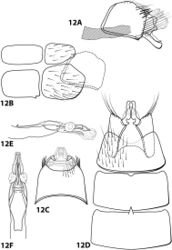Leucotrichia brochophora
| Notice: | This page is derived from the original publication listed below, whose author(s) should always be credited. Further contributors may edit and improve the content of this page and, consequently, need to be credited as well (see page history). Any assessment of factual correctness requires a careful review of the original article as well as of subsequent contributions.
If you are uncertain whether your planned contribution is correct or not, we suggest that you use the associated discussion page instead of editing the page directly. This page should be cited as follows (rationale):
Citation formats to copy and paste
BibTeX: @article{Thomson2015ZooKeys, RIS/ Endnote: TY - JOUR Wikipedia/ Citizendium: <ref name="Thomson2015ZooKeys">{{Citation See also the citation download page at the journal. |
Ordo: Trichoptera
Familia: Hydroptilidae
Genus: Leucotrichia
Name
Leucotrichia brochophora Flint, 1991 – Wikispecies link – Pensoft Profile
- brochophora Flint, 1991: 41 [Type locality: Colombia, Dpto. Antioquia, Quebrada Espadera, 7 km E Medellín, road to Sta. Elena; NMNH; male].
Diagnosis
This species is most similar to Leucotrichia lerma, Leucotrichia padera, and Leucotrichia rhomba sp. n. All these species possess a phallus with no spines and few, if any, elongate sclerites on the membranous apex; a mild, broad protuberance on the posterolateral margin of sternum VIII; and anterolateral margin on segment IX produced. Leucotrichia brochophora can be recognized by the presence of basal supports on the basal loop of the phallus midlength complex, a small mesoventral process on sternum VI, and stout pegs on the posterolateral margin of segment IX, all of which are absent in the other 3 species.
Description
Male. Length of forewing 5.2 mm (n=1). Head unmodified, with 3 ocelli; antennae unmodified. Dorsum of head cleared in holotype, brown; thorax brown with dark brown and yellow setae dorsally, brown ventrally; leg segments with light brown setae. Forewings covered with fine yellow setae, apical 1/3 with dark brown setae. Genitalia. Abdominal sternum VI with small pointed mesoventral process (Fig. 12D), obscured by setae in lateral view. Abdominal sternum VII with mesoventral process broken (indicated in Fig. 12D). Sternum VIII in ventral view with posterior margin concave. Segment IX anterolateral margin convex, posterolateral margin convex with stout peg-like setae dorsolaterally; in dorsal view anterior margin concave, posterior margin concave. Tergum × with dorsal sclerite simple; ventral sclerite lower half bent anteriad; membranous apex suborbicular. Subgenital plate with dorsal arm not apparent; ventral arm tapering apically, in ventral view apex broadly rounded. Inferior appendage with knoblike basal projection, apex truncate, bearing single dorsal spine; in ventral view with subbasal subtriangular emargination on inner margin, apex rounded. Phallus with median complex bearing basal supports; apex bearing 3 pairs of elongate sclerites: 1st pair dorsal and with shallow apical emargination, 2nd pair dorsal and with small apical projection, 3rd pair lateral and slender.
Material examined
Holotype male: COLOMBIA: Antioquia: Quebrada Espadera, 7 km E Medellín, road to Sta. Elena, 24.ii.1983, O.S. Flint, Jr. (USNM 104527) (NMNH).
Etymology
Unknown.
Taxon Treatment
- Thomson, R; Holzenthal, R; 2015: A revision of the Neotropical caddisfly genus Leucotrichia Mosely, 1934 (Hydroptilidae, Leucotrichiinae) ZooKeys, (499): 1-100. doi
Images
|
